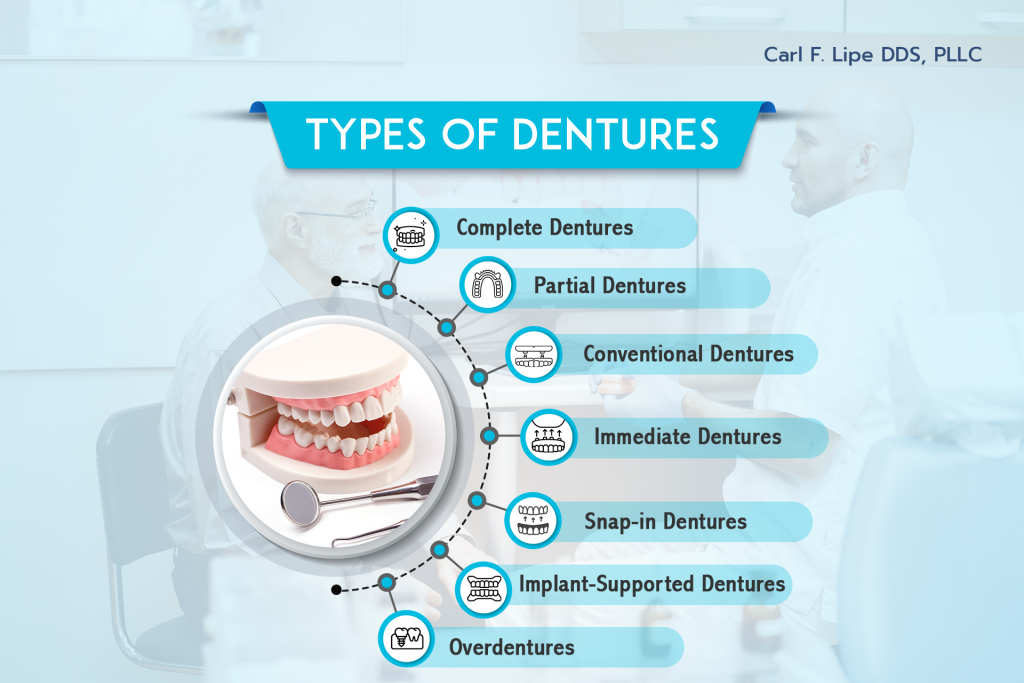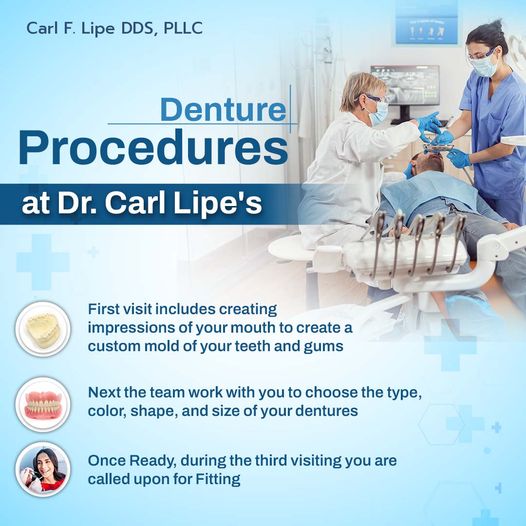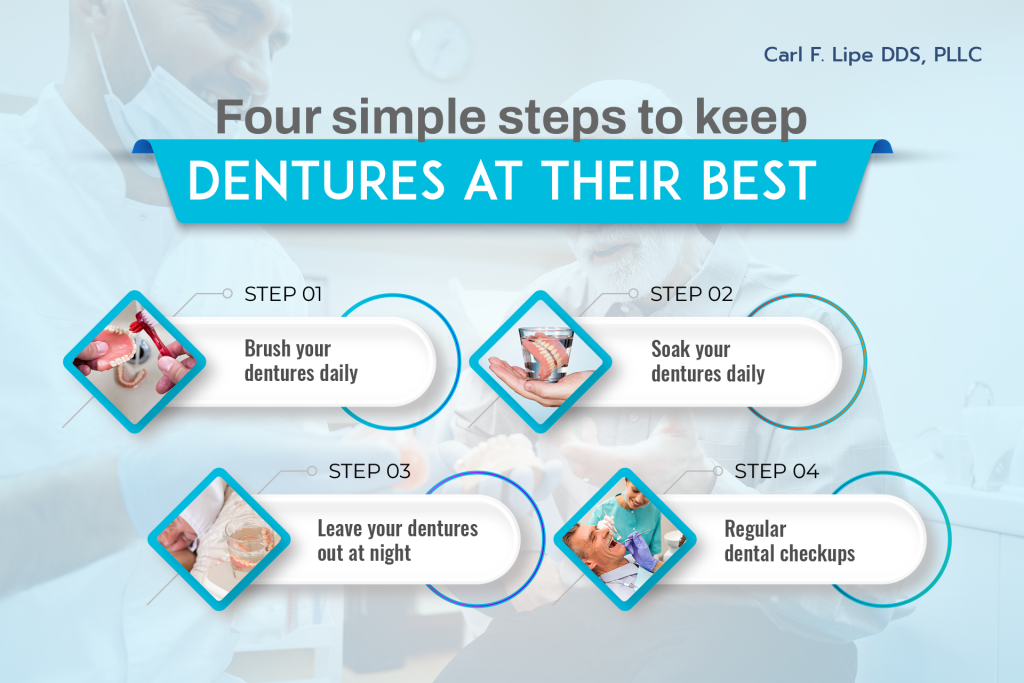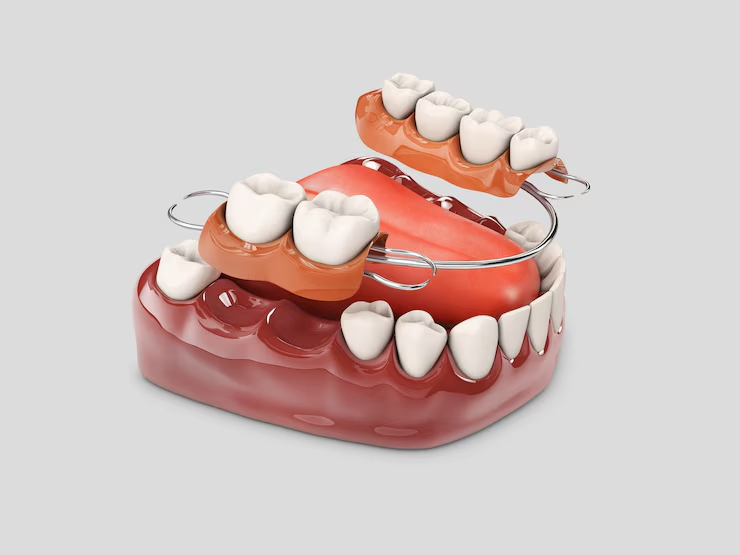Dentures are an effective remedy for those seeking to reinstate the functionality and natural appearance of their teeth. Dentures also help to restore the ability to chew, smile, and speak with confidence. By scheduling an online appointment today, you can enjoy the benefits of dentures.
What are Dentures?
Dentures are custom-made dental prostheses used to replace missing teeth and the tissues that surround them. They are removable dentures that supplant missing teeth in both the upper and lower jaws. Dentures are made of many different materials including composite resin, porcelain, acrylic resin, and acrylic. They offer practical and stylish advantages, improving facial appearance.
Why do you need Dentures?
1. Missing Teeth
Dentures are necessary when you lose your natural teeth due to trauma, decay as well as tooth extractions.
2. Chewing Difficulties
Eating or chewing is a typical problem when your natural teeth are missing.
3. Speech Impairment
Missing teeth can hinder the clarity of speech, thus affecting your confidence while speaking. Dentures can help improve speech and pronunciation.
4. Aesthetic Concerns
Dentures are a cosmetic solution to resolve the aesthetic concerns caused by missing teeth.
5. Preservation of Facial Structures
Loss of teeth can cause changes in the facial shape that can lead to the appearance of aging and sagging. Dentures offer vital support, protecting facial contours and stopping the degeneration of muscles to achieve a more youthful appearance.
What are the benefits of Dentures?
1. Chewing Function
Dentures help people chew with ease, allowing them to eat a variety of balanced diets.
2. Speech Improvement
Dentures are used to fill gaps in teeth and aid in pronunciation as well as articulation. This leads to improved communication and increases confidence in professional and social interactions.
3. Aesthetic Enhancement
Dentures give a natural appearance to your smile that restores facial beauty and confidence. It improves self-esteem, creating a more lively and younger appearance overall.
4. Support for Facial Structures
Losing dentures could result in facial sagging and an old appearance. Dentures offer crucial support to facial structures, keeping them in alignment and stopping the collapse of facial muscles. This helps to create an improved and more well-defined facial contour.
Different Types of Dentures

Dentures are removable dental prostheses designed to replace missing teeth and the tissues surrounding them. There are various options to choose from. Below is a Denture available for your various requirements.
1. Full Dentures
Full dentures are replacements for entire teeth that are missing on either the lower or upper jaw. They improve chewing capacity, better speech, and an attractive, natural-looking smile.
2. Partial Dentures
Partially dentures are suggested for individuals with some natural teeth left. These dentures can fill in gaps and help restore a complete smile. They are removable, which makes them easy to clean and also helps prevent the remaining teeth from moving. Understand the differences between full and partial dentures by reading this blog.
3. Conventional Dentures
Conventional dentures are a step-by-step procedure that begins with tooth extraction. They are made to fit precisely and offer the perfect balance of functionality, comfort, and aesthetics.
4. Immediate Dentures
Immediate dentures provide an immediate solution that can be inserted right after tooth extraction. While they provide immediate function, adjustments might be required while the mouth heals.
5. Snap-in Dentures
Snap-in dental dentures, also known as overdentures, are securely attached to natural teeth or dental implants with snaps and other connections. This increases stability and helps prevent sliding during everyday activities.
6. Implant-Supported Dentures
Implant-supported dentures are attached to dental implants that are surgically placed in the jawbone. They provide greater stability and can prevent bone loss.
Understanding the Denture Process: From Start to Finish

Dentures function as removable prosthetics for the teeth that are designed to restore missing teeth as well as improve the aesthetics and function of the mouth. The process of getting dentures requires a series of steps that ensure a custom and comfortable fit that is adapted to the individual’s specific oral anatomy and requirements.
1. Consultation
Contact Carl Lipe, and during the meeting, discuss your dental health background, preferences, and expectations. This discussion will lay the groundwork for establishing a personalized denture treatment plan.
2. Impressions & Measurements
With the help of modern methods, measurements and impressions of your mouth cavity are taken with care. These are used as a guideline to create dentures that are shaped to fit your mouth.
3. Tooth Extraction (if necessary):
In cases where tooth removal is necessary due to decay or damage, your dentist will delicately perform extractions. This step is vital to ensure a seamless fit and optimal comfort for your dentures.
4. Temporary Dentures (if needed)
To maintain functionality and aesthetics during the fabrication process, temporary dentures may be provided. These interim solutions enable you to eat and speak comfortably while awaiting your permanent dentures.
5. Denture Fabrication
With the gathered impressions and measurements, the dentists meticulously craft your dentures. The chosen materials replicate the natural appearance of teeth while ensuring durability and functionality.
6. Fitting and Adjustments
Once your dentures are ready, a fitting session is scheduled. Your dentist ensures the prosthetics fit precisely, making any necessary adjustments to guarantee comfort, stability, and proper functionality.
7. Follow-Up Appointments
The denture journey doesn’t conclude with fitting. Regular follow-up appointments are scheduled to address any evolving concerns, make additional adjustments, and maintain the long-term effectiveness of your dentures.
What to do after getting dentures?

1. Daily Cleaning
Gently brush dentures with a soft-bristle toothbrush and mild soap or denture cleaner to remove plaque and debris, maintaining oral hygiene.
2. Rinse After Meals
Rinse dentures after eating to eliminate loose particles and prevent staining. This simple step contributes to a fresh feeling throughout the day.
3. Handle with Care
Avoid bending or damaging your dentures. Handle them over a soft surface like a folded towel to prevent breakage if accidentally dropped.
4. Soak Overnight
Keep dentures moist by soaking them in water or a denture-cleaning solution overnight. This prevents warping and helps maintain their shape.
5. Regular Dental Check-ups
Schedule routine dental check-ups to assess the fit, make necessary adjustments, and address any emerging oral health concerns.
6. Avoid Hot Water
Clean dentures with lukewarm or cool water, as hot water may cause warping. Extreme temperatures can compromise the shape and fit of your dentures.
7. Avoid Abrasive Cleaners
Steer clear of abrasive toothpaste or harsh cleaners, as they can damage the denture material. Stick to recommended cleaning products for longevity.
8. Oral Hygiene for Natural Teeth
If you have remaining natural teeth, continue brushing them twice a day, along with regular flossing to maintain overall oral health.
9. Check for Cracks or Damage
Regularly inspect dentures for cracks, chips, or any signs of damage. Report any issues to your dentist promptly for timely repairs.
10. Avoid Chewy or Sticky Foods
Minimize consumption of sticky or hard foods to prevent denture damage. Opt for softer textures to ensure a comfortable eating experience.
11. Be Mindful of Denture Adhesives
Use denture adhesives sparingly and as directed. Excessive use may affect the fit, and it’s essential to follow your dentist’s recommendations.
12. Maintain a Balanced Diet
Eat a well-balanced diet rich in vitamins and minerals to promote overall health and support the longevity of your dentures.
Cost of Dentures in Denver , CO
The cost of dentures varies based on individual needs and the specifics of your case. We believe in transparent pricing and will provide a detailed breakdown of costs during your consultation.
Conventional Full Dentures – $1,000 to $3,000
Immediate Full Dentures:$1,500 to $4,000
Implant-Supported Full Dentures: $2,000 to $5,000
Overdentures: $4,000 to $30,000
Economy Dentures: $250 to $1250Custom Dentures:$3,000 to $8,000
Insurance and Coverage
Insurance coverage for dentures can vary. Our team is experienced in working with various insurance providers and will help you understand and maximize your benefits.
Assistance with Claim Filing
We assist with insurance claim filing to ensure you receive the maximum coverage possible. Our staff is always available to answer any questions and provide support throughout the insurance process.
Why Choose US ?
Choose Carl F. Lipe, DDS, PLLC for your dentures because of our commitment to quality, state-of-the-art technology, and personalized patient care. Our team’s expertise ensures you receive the best possible treatment with results that speak for themselves. We also offer Dental Bridges , Cosmetic Dentistry , Denture Solution , Dental Bonding , Full Mouth Reconstruction , dental implants and more. Follow us on Facebook & Instagram for latest dental tips.
Clinic Tour Video
Ready to take the first step towards a new smile? Contact us today to schedule a consultation and learn more about our Denture services. Your journey to a perfect smile starts here.
FAQ
-
What are dentures?
Dentures are removable dental elements that work as a replacement for your missing teeth and surrounding tissues.
-
How much do dentures cost?
The cost of dentures in Denver can range from $1,000 to $3,000 per arch, depending on the type and quality.
-
Does Medicare cover dentures?
No, in most cases, dental services are not included in Medicare.
-
What is a partial denture?
A partial denture is a removable denture that usually replaces multiple teeth of your upper or lower jaw while others remain.
-
How much do snap-in denture implants cost?
The per arch cost of snap-in denture implants varies between $8,000 and $12,000.
-
How to clean dentures?
Dentures should be cleaned daily with a soft-bristled brush and a non-abrasive denture cleanser.
-
Does Medicaid cover dentures?
Medicaid may cover dentures in some cases, depending on the state’s specific Medicaid plan.
-
How much are partial dentures?
Partial dentures can cost between $600 and $1,200.
-
How much do dentures cost with extractions with insurance?
With insurance, the cost of dentures with extractions can vary widely but typically ranges from $75 to $2,50 per quadrant.
-
How much do partial dentures cost without insurance?
Without insurance, partial dentures typically cost between $500 and $2000.
-
What can I use instead of denture glue?
Alternatives to denture glue include apple cider vinegar which can create a bond between the dentures and gums. Also, cornstarch paste is a generic and inexpensive alternative to denture glue.
-
How long do dentures last?
Dentures typically last more than 5 years with proper care.
-
Can you eat with dentures?
Yes, you can eat with dentures, though it may take some time to adjust to them.
-
Can you sleep with dentures?
It is generally recommended to remove dentures at night to give your gums a rest
-
How do you clean dentures?
Brush the dentures on a regular basis with a soft-bristled brush and a mild denture cleanser solution.
-
How long does it take to get dentures?
Getting dentures can take an average of six weeks to three months, depending on the type of denture and the individual case.
-
Are temporary snap-on dentures reusable?
Yes, after a thorough cleaning and proper maintenance, temporary snap-on dentures can be reused. This type of denture is meant for short-term use until permanent dentures are ready.
-
How to remove denture adhesive?
Remove denture adhesive by brushing your gums and dentures with a soft-bristled toothbrush and warm water.
-
What is the best glue for dentures?
The best glue for dentures varies, but popular brands include Poligrip and Fixodent.
-
What should I soak my dentures in at night?
Soak dentures in a denture-cleaning solution or water overnight.
-
How to fix broken dentures at home?
Fixing broken dentures at home is not recommended; it’s best to see a dentist. Temporary repair kits are available at pharmacies.
-
What is the fastest way to heal denture sores?
The fastest way to heal denture sores is to remove the dentures, rinse with salt water, and use an over-the-counter oral gel.
-
Can immediate dentures be permanent?
Immediate dentures are temporary and are used while waiting for the permanent dentures to be made.
-
Can you chew gum with dentures?
It is possible, but not recommended as gum can stick to dentures.
-
Does Delta Dental cover dentures?
Delta Dental may cover part of the cost of dentures, depending on the specific plan.
-
How to reline dentures yourself?
Denture reline kits are available at pharmacies, but professional relining by a dentist is recommended.
-
How to remove tartar from dentures instantly?
Soak dentures in a denture-cleaning solution and use a soft brush to remove tartar.
-
Where can I buy acrylic resin glue for dentures?
Acrylic resin glue for dentures can be purchased at pharmacies or online.
-
How to clean partial dentures?
Clean partial dentures the same way as full dentures: with a brush and denture cleaner.
-
Are dentures uncomfortable?
Dentures can be uncomfortable at first but should become more comfortable over time with proper adjustments
-
How long does it take to make dentures?
Making dentures can take anywhere from a few weeks to a few months.
-
What can you eat with dentures?
Soft and easily chewable food items like applesauce, yogurt, smoothies, soup, pudding etc. However, it is recommended to avoid sticky or hard foods initially.
